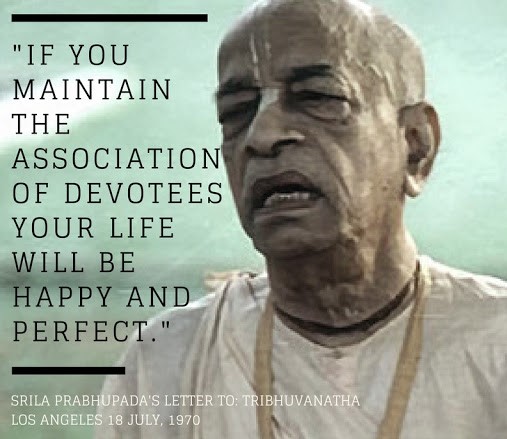
Hare Krishna and pranams dear devotees,
The current worldwide lockdown situation is unprecedented in recent history and presents a challenge to all humanity, including devotees. At this time material energy is very strong and sharp. She is continuously testing our faith. Doubts, which are anarthas, can easily enter our hearts, further weakening us spiritually, making us lax and lethargic. And an indiscriminate decision, material or spiritual, can very quickly land us in trouble. However, if we simply remain fixed in our daily sadhana, and service, and take proper shelter then these same circumstances can also become an instrument to develop our spiritual muscles.
One of the easiest and most effective way to remain enthusiastic and fixed in our sadhana is- devotee association- association of like-minded devotees- sajātīyāśaye snigdhe. During the lockdown, we have seen a worldwide explosion of online classes and seminars, making the best out of a bad situation. Applications like zoom allow devotees a free, easy and interactive way to connect online with other like-minded devotees. In fact, the quantity of quality devotee association available today is also unprecedented. Most senior sannyasis and devotees are giving online weekly classes where we can interact with them, ask questions, make new devotee friends, etc.. We should take advantage of these online sessions.
I recently came across a very inspiring lecture by HH Sacinandana swami on this topic. I am sharing it with you.
The safe boat of devotee association
The influence of maya is very difficult to overcome. In our scriptures, the material energy is therefore compared to an ocean. When you sail the ocean you never know when the weather will become stormy and high waves will make it impossible for you to continue your journey. Material life is similar – you never know when difficulties will shake you. Krishna explains this fact to Uddhava and then says:
“Devotees are like a strong boat that comes to rescue those persons who are repeatedly rising and falling in the fearful ocean of material life. Thus, they are the ultimate shelter” . (SB 11.26.32)
Krishna gives another example SB 11.26.31–
When someone approaches a fire in a dark night, all 1) coldness, 2) fear and 3) darkness will go away.
Something similar happens when one comes into the association of devotees.
1) Your dullness goes away
2) your fear of samsara leaves you and also
3) the darkness surrounding you in the form of the uncertainty of how to reach Krishna disappears.
You will no longer worry: “How will I approach Krishna, reach Him and how will I please Him?” This is because in the association of devotees you come in contact with, talk about, glorification of Krishna and the sincere effort to please Krishna. Seeing this, Krishna feels invited and comes into the association – and everyone can feel it. Everyone can feel the effect of such kirtan in the heart; when it starts to blossom and lighten up.
Krishna also often manifests Himself through what the devotees say and share with us and we feel that “ Krishna spoke to me through this devotee! ”
Another effect of the association of devotees is the feeling “Oh, I have become so neglectful of devotional service, my consciousness has become so invaded by the material energy and I again feel the same attraction to maya as earlier in my life”. In other words, we become humble by seeing the good qualities of the devotees and by this newfound humility, which wakes us up, even startles us at times, we are at a great starting point for serious practice.
To summarize, the association of devotees gives us the following blessings: it destroys our spiritual dullness, it removes the fears of material life and dissolves our uncertainty about how to reach Krishna .
“Therefore,” Krishna says to Uddhava, “ an intelligent person should take up the association of saintly devotees, whose words cut off the excessive attachment of one’s mind.”
(HH Sacinandana swami)
The above words touched my heart and I pray and hope they touch your heart as well. I realised the importance and urgency to actively seek devotee association, more so during the current pandemic when material energy is so strong. If we combine a firm sadhana and devotee association with daily reading of Bhagavad Gita, Srimad Bhagavatam or Krishna book then we will find ourselves properly sheltered and nourished even the under the present lockdown conditions.
Circumstances do not make us Krishna conscious, it is what we do under particular circumstances that make us Krishna conscious.
All the best.
All glories to devotee association
All glories to Srila Prabhupada
your servant,
Giriraj dasa

